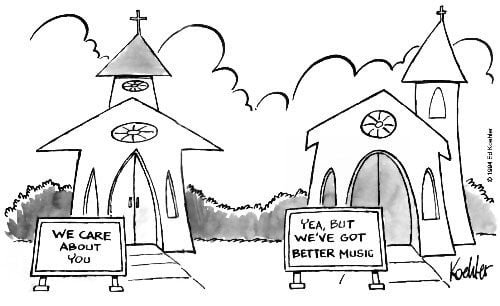
Several years ago, my friend Zoe used the phrase “church hopping” in a comment. People raised in Evangelical churches know all about church hopping, but non-Evangelicals might not understand the phrase, so I thought I would explain the fine art of church hopping.
A church hopper is a person who “hops” (moves) from one Evangelical church to another. Sometimes, groups of people hop from one church to another. In the mid-1980s, more than 25 people from an Independent Fundamentalist Baptist (IFB) church in New Lexington, Ohio hopped to the church I was pastoring at the time, Somerset Baptist Church in Mt. Perry. Around this same time, 15 or so people left their IFB church in Fultonham and joined Somerset Baptist. Forty new members, most of them “mature” tithing Christians eager to take over — I mean get involved with — my church. Within two years, all these hoppers hopped right back to the churches they left or joined up with new IFB churches.
Why do people hop from one church to another?
Some people hop because they have run afoul of their pastor and/or the church’s power brokers. Every church has a clique that controls the church. This clique often consists of the pastor’s enforcers, people who make sure others are playing by the rules, and believing the right things.
Evangelical churches thrive on conformity. Independent or contrary thinkers are often marginalized, if not run out of the church. Sometimes, people hop before they are shot and left for dead.
Some people hop because they can’t get their way. Pastoring a church is a difficult proposition. No two people think alike. While everyone is allegedly indwelt by the Holy Spirit who supposedly teaches them the truth, churches are rife with differences of opinion. Sometimes, those differences turn into internecine wars, leading those defeated in battle to leave. I lost countless congregants over theological and practical differences. Oh, the stories I could tell . . .
Some people hop from one church to another because they don’t like their church’s new pastor. Bruce, I thought church was all about JESUS? Silly boy, church is all about the pastor, his beliefs, his practices, and his personality, not Jesus. Churches revolve around their pastors. Bringing in a new pastor invariably brings change, especially if a man is replacing a pastor who has been there for years. Attendance decline is common when churches change pastors. Megachurches can lose thousands of members when changing brands — yes, at this level, pastors are brands. (Please see The Evangelical Cult of Personality.)
Some church members hop to new congregations because they perceive their churches to be “dead.” In the 1970s, new charismatic churches pillaged countless Baptist churches of members who were looking for churches that were alive, filled with the Holy Ghost. Here in rural northwest Ohio, numerous charismatic churches sprung to life, filled with hundreds and hundreds of members who had hopped their way from “dead” churches. Today, every one of these churches is in numerical decline, each a shell of what it once was in the 1970s and 1980s. Their members have been poached by newer, more exciting churches. The churches once deemed “alive” are now considered “dead.”
What drives this thinking? Simple, Evangelicals are always on the lookout for a good show, for the new and exciting. People are attracted to new churches by the preacher’s personality and preaching style, whether prospective churches have certain programs — say a youth program or the quality of the church’s band. The grass is always greener on the other side of the fence is certainly a false notion embraced by many Evangelical Christians,
Some people don’t like change, so they will hop to churches that practice the “old ways.” Most Evangelical churches have bands or use praise and worship music. Some congregants don’t like any kind of music except hymns. The same goes for tinkering with service times, changing dress standards, using non-KJV translations, etc. There’s no end to the reasons people use to justify hopping.
My all-time favorite reason for church-hopping is this: “I am not being ‘fed’ anymore.” What, did the church cancel the monthly church dinner or stop having potlucks? No, “not being fed” means that the pastor’s preaching no longer meets their intellectual or felt needs. Truth be told, listening to the same man year in and year out can be boring. Instead of admitting this, many congregants blame their pastors for not meeting their needs.
Honesty, in general, is lacking in many Evangelical churches. Instead of being honest about their reasons for hopping away, disgruntled church members blame their pastors. Much like marriages, not every pastor/church/congregant relationship is meant to last for life. Sometimes, it’s time for a change of scenery — new church/pastor.
It is not uncommon to hear Evangelical preachers rail against church hopping. Much like former President Trump’s relationship with people who left his cabinet, to pastors, church hoppers look great coming in the front door, but when they leave out the back door, all of a sudden they are terrible people. I know of pastors who eviscerate anyone who dares to leave their cult – uh, I mean church. Such pastors believe their church/preaching/ministry is far superior to that of any other pastor/church in town. In their minds, it makes no sense to go anywhere except their church.
Early in the ministry, I could be quite harsh towards people who left my church. Sometimes, my criticisms were justified, but all too often I was just being an asshole towards people who disagreed with me. I later learned to be more magnanimous towards people who left. On more than a few occasions, people who hopped away from my church returned months or years later.
Many Evangelical pastors think people should attend their churches until death. They expect lifelong commitments from their congregants. However, pastors hop from one church to another all the time. Pastors change churches on an average of every 4 to 10 years. (Please see How Long Do Pastors Stay in One Church?) Why is it that Evangelical pastors preach against congregants who church hop, yet when they do it, it’s God “leading” them? Anytime you have a group of people with varied personalities and backgrounds, conflict and change are inevitable. Leave it to Evangelicals to find all sorts of justifications for hopping instead of telling the truth. Why did you leave your church or pastorate? Drumroll, please. Because I wanted to.
Bruce Gerencser, 68, lives in rural Northwest Ohio with his wife of 47 years. He and his wife have six grown children and sixteen grandchildren. Bruce pastored Evangelical churches for twenty-five years in Ohio, Texas, and Michigan. Bruce left the ministry in 2005, and in 2008 he left Christianity. Bruce is now a humanist and an atheist.
Your comments are welcome and appreciated. All first-time comments are moderated. Please read the commenting rules before commenting.
You can email Bruce via the Contact Form.


